An Interview with Florian Kiendl, RKC Team Leader, CK-FMS
by Adrienne Harvey PCC-TL, RKC-II, CK-FMS, Primal Move Nat’l Instructor
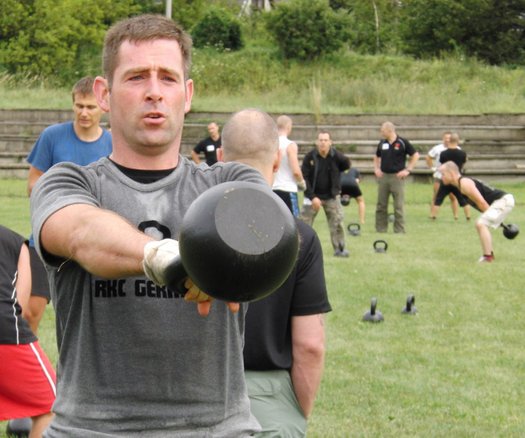
Dragon Door: You’ve been involved with martial arts since childhood?
Florian Kiendl: Yes, it was an on and off thing at first. I started by trying taekwondo, then some judo, aikido, and other martial arts very briefly too. I have always had a fascination for martial arts. As a young adult, I finally found that taekwondo was the right martial art for me, and decided to stick with it.
Dragon Door: When we talked earlier you mentioned finding kettlebells by coincidence, how did that happen?
Florian Kiendl: I was working alongside
Robert Rimoczi on an IT project. We were talking during lunch one day. I told him I practiced taekwondo and planned to open a studio. Hearing that, he said he had something really special and that I should really check it out. To be honest I was not very interested at the time and didn't really want to try it! I was happy just training taekwondo, and felt like that was fine for me. But Robert was really persuasive, so I agreed to try kettlebell training with him. After just one session, I couldn't move the next day. I could barely even get out of my office chair. At the time I thought I was really fit. I wasn’t untrained—I’d been training 3-5 times a week! So, I decided to train with kettlebells. If it could make a wreck out of me in such a short time, what would happen if I used it on a regular basis? What kind of progress could I be making? That's what got me hooked, and the next year I found myself in Hungary for the
RKC Workshop.
Dragon Door: Did you train for the RKC with Robert? How did you prepare?
Florian Kiendl: After attending Robert’s eight-week kettlebell course, I trained mostly by myself. I developed my own programs especially for RKC preparation, and they worked well. However, when I ran into problems, I could always ask Robert for help. Today I continue this tradition with my clients who are preparing for the RKC.
Dragon Door: Do you feel like your kettlebell training has also helped your martial arts practice?
Florian Kiendl: Absolutely. I am sure that I can now do many of the things that I've always wanted to achieve in martial arts because of my kettlebell training.
Kettlebell training has helped with roundhouse 360 kicks, and many related moves. I think it also has helped my board breaking—it’s helped with a lot of things!
Dragon Door: What are some of the most important concepts you’ve learned from kettlebells and the RKC?
Florian Kiendl: I was really well prepared for the actual RKC workshop, and being there was an absolutely great experience. I wouldn’t have wanted to miss a second of it, and picked up a lot of subtleties at the workshop. Before the RKC, I’d prepared for about six months, mainly because Robert told me the workshop is very hard, and that I would need to train to make it through those three days. So, I was ready to learn a lot of subtleties at the workshop, but had figured out a lot of the general concepts during my preparation, and while talking with Robert.
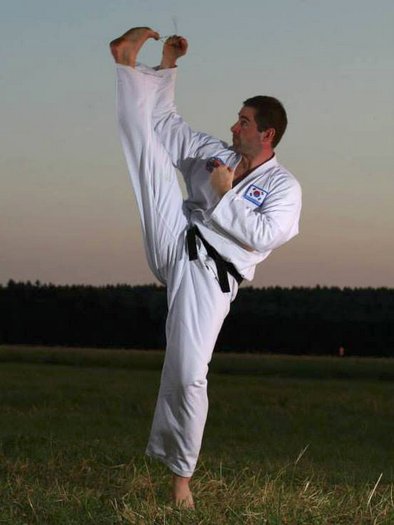 Dragon Door:
Dragon Door: What were some of those bigger ideas and insights you got from your preparation training with Robert?
Florian Kiendl: I learned that strength training is the foundation of performance. I practice Classical Taekwondo, which is a non-contact sport with no real competition. It’s sometimes hard to measure my strength since we don’t have situations where I actually have to compete against someone else. When I talk to full contact martial artists, they say every student who drops in immediately knows that he needs to strength train. In our traditional taekwondo, this is not the case—most people don't do any strength training, they exclusively train taekwondo. So, it was a very big insight for me to realize that strength training could really benefit my taekwondo.
Taekwondo is a fairly new martial art—it’s only about 60 years old. In the beginning it was a non-contact, non-competitive sport. About 40 years ago, they wanted to add it to the Olympics, and to make it compatible with that type of competition, they created modern taekwondo. There are still a few teachers who instruct the old way, which is more Zen than sport.
Dragon Door: Since you’ve added kettlebell classes to the program at your martial arts studio, are your students more receptive to kettlebells at first than you were?
Florian Kiendl: Yes and no. There are some students who specifically came to me because I offer both, and others who only train classic taekwondo. I added kettlebells as a bonus, so people can choose to go to kettlebell classes. We have classes that are exclusively taekwondo, and then for anyone who is interested, we also have kettlebell classes.
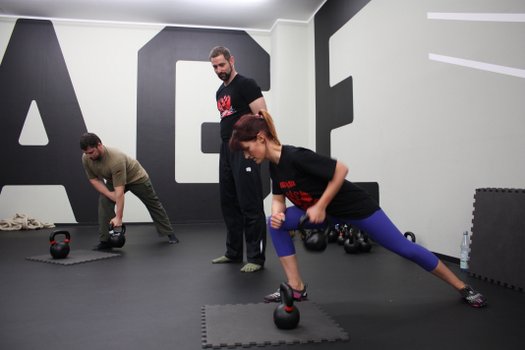
Dragon Door: Who do you usually train with kettlebells?
Florian Kiendl: At the moment, I am mostly teaching kettlebell workshops for people from Germany and other German-speaking countries like Austria and Switzerland. Many of the people who travel here to train for weekend workshops are fitness trainers preparing for an RKC workshop, or are thinking about possibly taking the RKC workshop and do not have anyone nearby to train with. In Germany, there are only a few RKC instructors and we are spread out across the country. If you want to learn about kettlebells and are not lucky enough to live in a city with an RKC instructor, then you have to travel.
Dragon Door: What kind of results have you personally experienced with kettlebells?
Florian Kiendl: Last year I managed to do a get-up with the
48kg kettlebell. I also pressed half my bodyweight, which was required for my
RKC-II Certification. Now I am working on the bent press which I had struggled with for a long time. Last September, Max Shank showed me how to do it correctly and now I am really progressing with it.
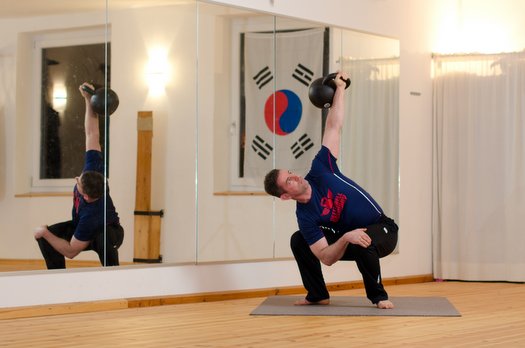
Dragon Door: Now that you've been promoted to RKC Team Leader, what do you plan to bring to your leadership position?
Florian Kiendl: I will continue to spread the word about kettlebells, and want to get more people interested in kettlebell training in Germany. I want to help make the RKC a very well-known brand for good training services. At the moment, I am also working on a program for training clients online.
Dragon Door: You've had a successful blog for quite a while, too. When did you begin?
Florian Kiendl: I started it around the time of my first RKC workshop. I’ve since switched the platform, so some of the old posts have vanished, but I have been blogging for quite a while. I’ve used my current platform for about two years now.
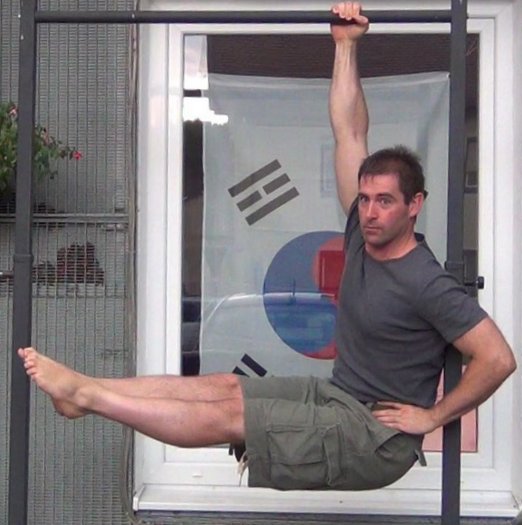 Dragon Door:
Dragon Door: In Germany, what kind of kettlebell information are people looking for on your blog?
Florian Kiendl: One of my most popular blog posts is actually about myofascial release. I also have several posts about different kettlebell exercises. The post that gets the most hits is about the kettlebell snatch, which is what I would have expected. But the post which is the easiest to find on Google is about myofascial release. That post was basically about how I started to try it, and that it worked well for me. I am not even a specialist in that area and I also do not have any professional expertise with myofascial release!
Dragon Door: Do you have any specific goals you are working towards? You mentioned the bent press earlier for example...
Florian Kiendl: I am working on the bent press and want to eventually work with even heavier kettlebells as a way to progress towards the beast press. So while I am working on the bent press, the big goal in the background is the beast press.
Dragon Door: Are you going to try for the Beast Tamer Challenge at some point?
Florian Kiendl: Yes, at some point, but not right now. One thing at a time. First I need to be able to press the beast, then we will see what happens next.
Pull-ups are very challenging for me, so the weighted pull-up will be the hardest part of the challenge for me.
Dragon Door: What is your favorite kettlebell exercise?
Florian Kiendl: I'd say it's the get-up because simply because I enjoy practicing it the most. Many of my own training sessions are get-up exclusive. My own training sessions are often very experimental. At the moment I am actually experimenting with barbell training, so kettlebells are in the background right now, but I always seem to come back to them.
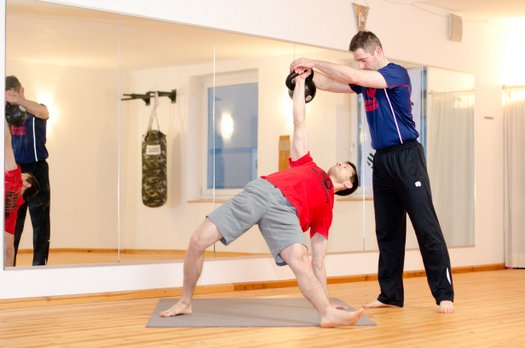
My next goal will be preparing for the
upcoming PCC in Munich. I will be doing a lot of bodyweight exercises and working to polish up my one-arm push-up and so on. But, on the days when I know I need to train but am not sure what to do, I always start with get-ups. I enjoy them a lot because sometimes when I want to train, I need to clear my mind first. I’ve found that if I just do a hard swing or snatch workout that effect happens, but it’s harder to achieve. When I practice get-ups, it is much easier for me to get in the right mental state. During get-ups, I usually increase the weight used one rep at a time. This process ensures that I am very focused, which works well for me.
Back